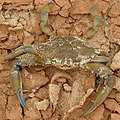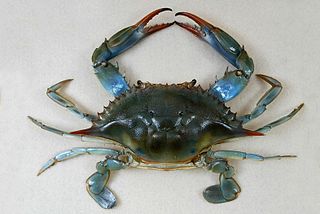
Callinectes sapidus, the blue crab, Atlantic blue crab, or, regionally, the Maryland blue crab, is a species of crab native to the waters of the western Atlantic Ocean and the Gulf of Mexico, and introduced internationally.

Mary Jane Rathbun was an American zoologist who specialized in crustaceans. She worked at the Smithsonian Institution from 1884 until her death. She described more than a thousand new species and subspecies and many higher taxa.

Porcelain crabs are decapod crustaceans in the widespread family Porcellanidae, which superficially resemble true crabs. They have flattened bodies as an adaptation for living in rock crevices. They are delicate, readily losing limbs when attacked, and use their large claws for maintaining territories. They first appeared in the Tithonian age of the Late Jurassic epoch, 145–152 million years ago.

Portunidae is a family of crabs which contains the swimming crabs. Its members include many well-known shoreline crabs, such as the blue crab and velvet crab. Two genera in the family are contrastingly named Scylla and Charybdis; the former contains the economically important species black crab and Scylla paramamosain.

Cronius is a genus of crabs containing the two species Cronius ruber and Cronius tumidulus.

Ozius is a genus of crabs in the family Menippidae, containing the following species:

Callinectes bellicosus is a species of swimming crab in the genus Callinectes. They are native to warm waters and shorelines in Mexico. They are prepared and eaten in the same manner as blue crabs.

Callinectes marginatus, commonly known as the sharptooth swimcrab or marbled swimcrab, is a species of swimming crab in the family Portunidae.

Crab fisheries are fisheries which capture or farm crabs. True crabs make up 20% of all crustaceans caught and farmed worldwide, with about 1.4 million tonnes being consumed annually. The horse crab, Portunus trituberculatus, accounts for one quarter of that total. Other important species include flower crabs, snow crabs (Chionoecetes), blue crabs, edible or brown crabs, Dungeness crab, and mud crabs, each of which provides more than 20,000 tonnes annually.

Callinectes similis, sometimes called the lesser blue crab or dwarf crab, is a West Atlantic species of blue crab. It was described by Austin B. Williams in 1966.
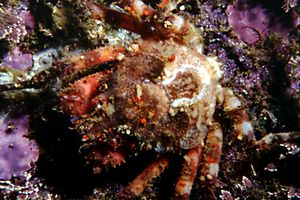
Herbstia is a genus of crabs, containing the following eleven species:
Hematodinium is a genus of dinoflagellates. Species in this genus, such as Hematodinium perezi, the type species, are internal parasites of the hemolymph of crustaceans such as the Atlantic blue crab and Norway lobster. Species in the genus are economically damaging to commercial crab fisheries, including causing bitter crab disease in the large Tanner or snow crab fisheries of the Bering Sea.
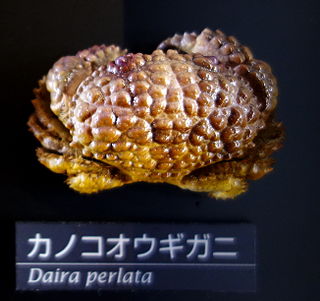
Dairoidea is a superfamily of crabs, comprising two families which each contain a single genus: Dairidae and Dacryopilumnidae (Dacryopilumnus) .
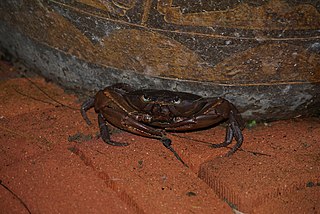
Epilobocera is a genus of crabs in the family Epiloboceridae. It is the only genus in its family; this taxonomic arrangement follows the revision of the family Pseudothelphusidae by Álvarez and colleagues.
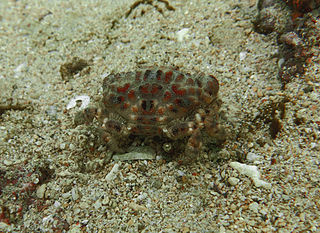
Paractaea is a genus of crabs in the family Xanthidae, containing the following species:

Heteractaea is a genus of crabs in the family Xanthidae, containing the following species:
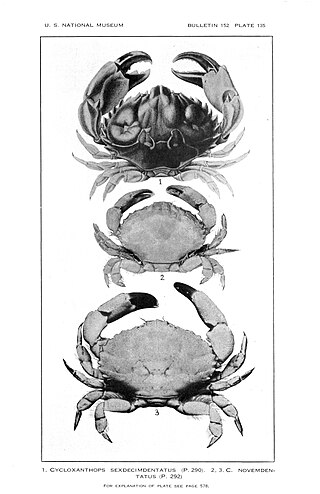
Cycloxanthops is a genus of crabs in the family Xanthidae, containing the following species:

The Panopeidae are a family containing 26 genera of morphologically similar crabs, often known as "mud crabs". Their centers of diversity are the Atlantic Ocean and eastern Pacific Ocean.
Mithraculus cinctimanus is a species of crab in the family Majidae. It is found in the Caribbean region and is usually associated with a sea anemone, sponge or coral.

Johngarthia planata is a bright orange species of land crab that lives on inshore islands and the continental mainland coast of the tropical and subtropical Pacific coast of the Americas, including the Gulf of California, Costa Rica, Colombia, and continental mainland beaches of Mexico. The crabs are omnivorous and feed on seaweed (algae), vegetation and sometimes carrion.

